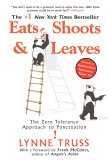Summary | Excerpt | Reviews | Beyond the Book | Readalikes | Genres & Themes | Author Bio

Critics' Opinion:
Readers' Opinion:
First Published:
Apr 2004, 240 pages
Paperback:
Apr 2006, 240 pages
 Book Reviewed by:
Book Reviewed by:
BookBrowse Review Team
Buy This Book
What happened to punctuation? Why is it so disregarded when it is self-evidently so useful in preventing enormous mix-ups? A headline in today's paper says, "DEAD SONS PHOTOS MAY BE RELEASED" – the story relating to dead sons in the plural, but you would never know. The obvious culprit is the recent history of education practice. We can blame the pedagogues. Until 1960, punctuation was routinely taught in British schools. A child sitting a County Schools exam in 1937 would be asked to punctuate the following puzzler: "Charles the First walked and talked half an hour after his head was cut off" (answer: "Charles the First walked and talked. Half an hour after, his head was cut off"). Today, thank goodness, the National Curriculum ensures that when children are eight, they are drilled in the use of the comma, even if their understanding of grammar is at such an early age a bit hazy. For Cutting a Dash we visited a school in Cheshire where quite small children were being taught that you use commas in the following situations:
1 in a list
2 before dialogue
3 to mark out additional information
Which was very impressive. Identifying "additional information" at the age of eight is quite an achievement, and I know for a fact that I couldn't have done it. But if things are looking faintly more optimistic under the National Curriculum, there remains the awful truth that, for over a quarter of a century, punctuation and English grammar were simply not taught in the majority of schools, with the effect that A-level examiners annually bewailed the condition of examinees' written English, while nothing was done. Candidates couldn't even spell the words "grammar" and "sentence", let alone use them in any well-informed way.
Attending a grammar school myself between 1966 and 1973, I don't remember being taught punctuation, either. There was a comical moment in the fifth year when our English teacher demanded, "But you have had lessons in grammar?" and we all looked shifty, as if the fault was ours. We had been taught Latin, French and German grammar; but English grammar was something we felt we were expected to infer from our reading – which is doubtless why I came a cropper over "its" and "it's". Like many uninstructed people, I surmised that, if there was a version of "its" with an apostrophe before the "s", there was somehow logically bound to be a version of "its" with an apostrophe after the "s" as well. A shame no one set me right on this common misapprehension, really. But there you are. I just remember a period when, convinced that an apostrophe was definitely required somewhere, I would cunningly suspend a very small one immediately above the "s", to cover all eventualities. Imagine my teenage wrath when, time after time, my homework was returned with this well-meant floating apostrophe struck out. "Why?" I would rail, using all my powers of schoolgirl inference and getting nowhere. Hadn't I balanced it perfectly? How could the teacher possibly tell I had put it in the wrong place?
Luckily for me, I was exceptionally interested in English and got there in the end. While other girls were out with boyfriends on Sunday afternoons, getting their necks disfigured by love bites, I was at home with the wireless listening to an Ian Messiter quiz called Many a Slip, in which erudite and amusing contestants spotted grammatical errors in pieces of prose. It was a fantastic programme. I dream sometimes they have brought it back. Panellists such as Isobel Barnett and David Nixon would interrupt Roy Plomley with a buzz and say "Tautology!" Around this same time, when other girls of my age were attending the Isle of Wight Festival and having abortions, I bought a copy of Eric Partridge's Usage and Abusage and covered it in sticky-backed plastic so that it would last a lifetime (it has). Funny how I didn't think any of this was peculiar at the time, when it was behaviour with "Proto Stickler" written all over it. But I do see now why it was no accident that I later wound up as a sub-editor with a literal blue pencil.
Reprinted from Eats, Shoots & Leaves by Lynne Truss by permission of Gotham Books, a member of Penguin Group (USA) Inc. Copyright © Lynne Truss, 2003. All rights reserved. This excerpt, or any parts thereof, may not be reproduced without permission.





The House on Biscayne Bay
by Chanel Cleeton
As death stalks a gothic mansion in Miami, the lives of two women intertwine as the past and present collide.

The Flower Sisters
by Michelle Collins Anderson
From the new Fannie Flagg of the Ozarks, a richly-woven story of family, forgiveness, and reinvention.

The Funeral Cryer by Wenyan Lu
Debut novelist Wenyan Lu brings us this witty yet profound story about one woman's midlife reawakening in contemporary rural China.
Your guide toexceptional books
BookBrowse seeks out and recommends the best in contemporary fiction and nonfiction—books that not only engage and entertain but also deepen our understanding of ourselves and the world around us.